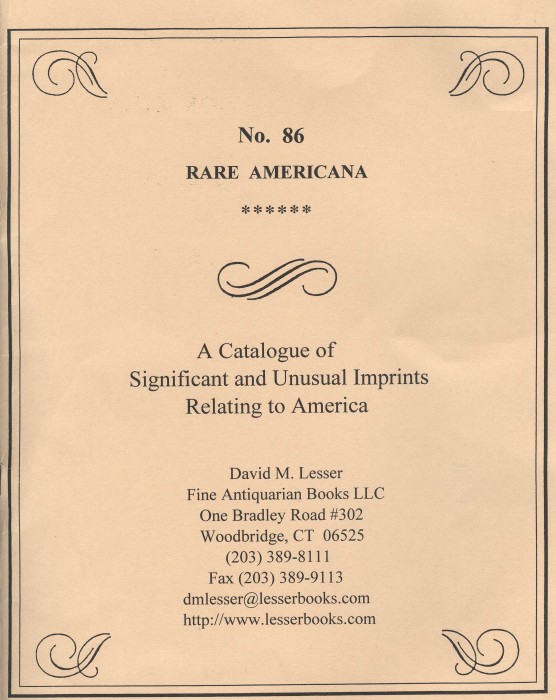Intriguing And Unusual Americana From David Lesser

Intriguing And Unusual Americana From David Lesser
By Michael Stillman
David M. Lessor Fine Antiquarian Books is offering their 86th catalogue of "Significant and Unusual Imprints Relating to America." Lesser regularly presents collections of Americana, mostly from the Revolutionary through the Civil War period. "Interesting and unusual" are good descriptions of the items they offer, as few are pieces you are likely to come across very often. Here are a few.
John Hancock is one of those famous and beloved patriots of the Revolution, though that fame and popularity come almost entirely from his having a very large and bold signature. That autograph is today one of the most collectible and valuable in the field of Americana. However, like most political figures of his day, or any other, not everyone liked him. Item 46 is The Writings of Laco, as Published in the Massachusetts Centinel....from 1789. "Laco" was Stephen Higginson, a Massachusetts politician and, like Hancock, delegate to the Continental Congress. The book is a scathing attack on the man for whom a large building in Boston and an insurance company are named. Higginson regarded Hancock as a vain man, interested more in his own image and popularity than any patriotic causes. "So great was his vanity, and so excessive his caprice, that his leaders were often at a loss to restrain and keep him steady," says Higginson. He also charges that Hancock was sought by Revolutionary leaders only because he came from a wealthy and prestigious family, and that even then they had to go to great efforts to keep him from defecting to the other side. Higginson's attack came out during Hancock's gubernatorial campaign of 1789. Hancock got the better of that battle, winning the election. The public saw him differently. Priced at $1,000.
Not everyone thought the colonial-era Stamp Act was such a bad thing. This 1766 London item is a strong apology for British colonial behavior: An Application of Some General Political Rules, to the Present State of Great-Britain, Ireland and America.... For the Irish, the anonymous author calls for union with the mother country. As for the American colonists, he chides that the Stamp Act is one way for them "to discharge themselves of the obligation of having received from England a body of excellent laws....a set of social improved manners....arts and sciences." We all know what the ungrateful Americans told the British they could do with their "improved social manners." Item 98. $500.